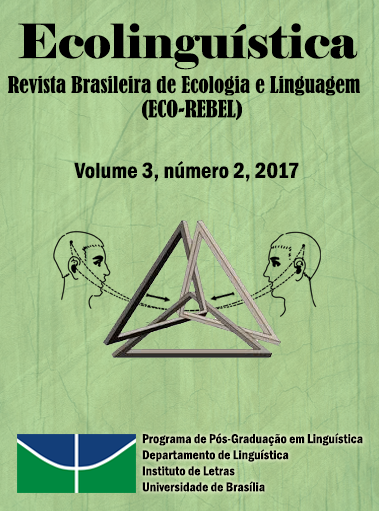Ecologia das línguas
Keywords:
Ecological linguistics. Language diversity. Biological diversity. Language vitality and death.Abstract
The objective of this text is to present some fundamental questions to those wishing to approach languages from an ecological perspective. The author does not give any answer to these questions, leaving to the reader the task of looking for them.
Downloads
References
DRECHSEL, Emmanuel. Mobilian Jargon. Oxford: Clarendon Press, 1997.
HALLIDAY, M. New ways of meanings. In M. PÜTZ (ed.) Thirty Years of Linguistic Evolution. Amsterdam: Benjamins, 1992.
HAUGEN, E. The Ecology of Language: Essays by Einar Haugen. Stanford: Stanford University Press, 1972.
FILL, A. Ökolinguistik. Tübingen: Gunter Narr Verlag, 1993.
_______. Ecolinguistics: State of the Art 1998. Arbeiten aus Anglistik und Amerikanistik 23 (1), 3-16, 1998.
MÜHLHÄUSLER, P. Preserving languages or language ecologies: a top-down approach to language survival. Oceanic Linguistics 31. 163-180, 1998.
_______. Language Ecology: Linguistic Imperialism and Language Change in the Pacific Region. London: Routledge, 1996a.
_______. Ecological and non-ecological approaches to language planning. In M. HELLINGER & U. AMMON (eds.) Contrastive Sociolinguistics. Berlin: Mouton de Gruyter, 1996b.
Downloads
Published
How to Cite
Issue
Section
License
Authors who publish in this journal agree to the following terms:
Authors retain copyright and grant the journal the right of first publication. The work is simultaneously licensed under the Creative Commons Attribution License allowing the sharing of the work with acknowledgment of the authorship of the work and initial publication in this journal.
Authors are authorized to enter into additional contracts separately for non-exclusive distribution of the version of the work published in this journal (e.g., publishing in institutional repositories or as book chapters), with acknowledgment of authorship and initial publication in this journal.
Authors are allowed and encouraged to post and distribute their work online (e.g., in institutional repositories or on their personal page) at any point before or during the editorial process, as this can bring about productive revisions as well as increase impact.
Citation of published works (See The Effect of Free Access).



3.png)



